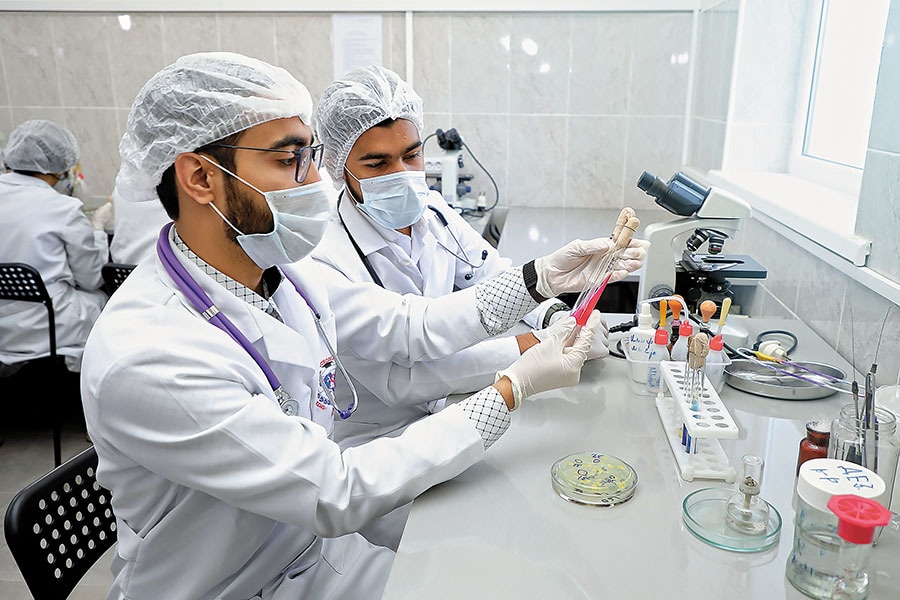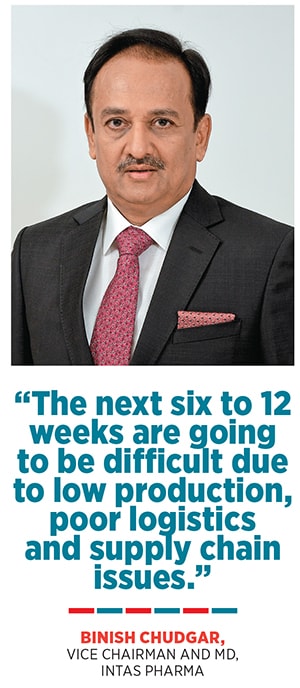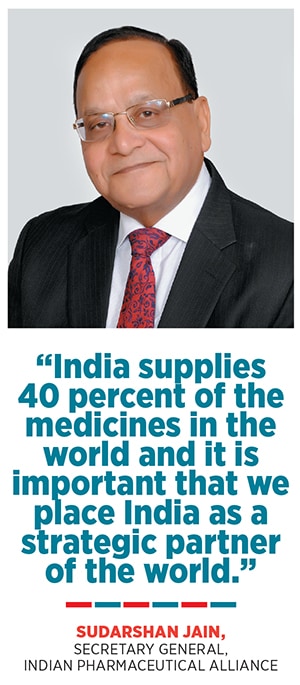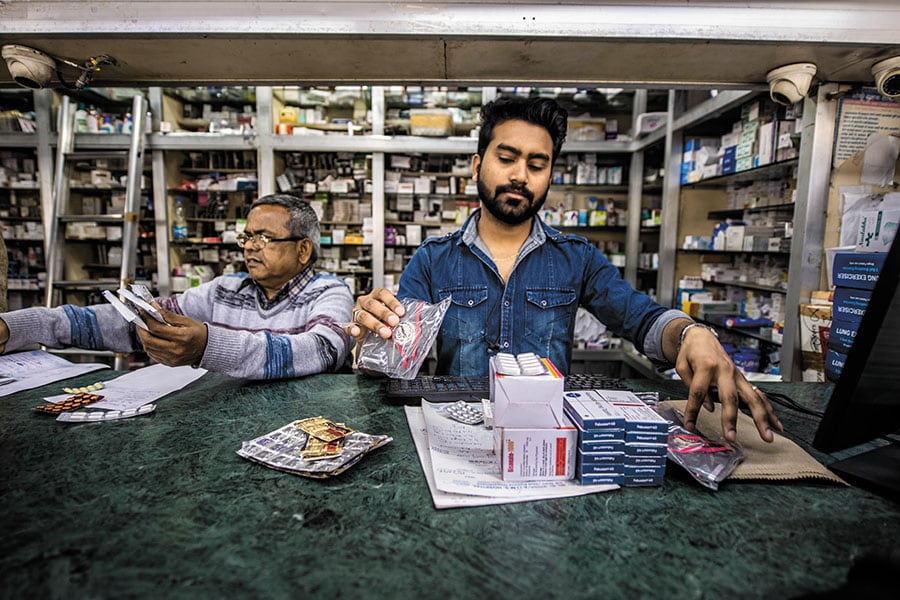
Bulk drugs: Pharma's pain point
Low production and poor logistics may affect the industry in the short term, while dependence remains on import of raw materials from China
 In the long term, Indian pharma companies need to reduce their dependence on Chinese APIs
In the long term, Indian pharma companies need to reduce their dependence on Chinese APIsImage: Shutterstock
Even as China slowly gets back on its feet in the wake of the Covid-19 pandemic, the Indian pharmaceutical industry is bracing itself for a reduction in profit margins in the short term. Though production of drugs is likely to increase to meet the increasing demand of products like anti-malaria drugs chloroquine and hydroxychloroquine, which are undergoing clinical trials for their effect on the Covid-19 virus, the pharma industry is expected to see a rise in the prices of Active Pharmaceutical Ingredients (API) and Key Starting Materials (KSM) as well as be affected by higher production costs resulting from the countrywide lockdown. APIs are chemical compounds that are the most essential raw material required to produce a finished medicine.
“Overall, the next six to 12 weeks are going to be difficult because of low production, poor logistics and supply chain issues, globally. There will also be issues on the collection front because we cannot ensure collection that rigorously,” says Binish Chudgar, vice chairman and MD, Intas Pharma. Besides, he adds, “Even with low production, we will have to keep on supporting employees, which would increase our production cost."
According to industry experts, most companies have an inventory of critical APIs and KSMs that might see them through the first quarter, but unless China ramps up production, there will be price pain in the short term.
“Companies have been maintaining inventory of critical APIs and KSMs, given the Chinese new year holidays [during which the Covid-19 outbreak began],” says Sudarshan Jain, secretary general of Indian Pharmaceutical Alliance (IPA), which along with the government has been monitoring the escalating situation closely to ensure production and supply of medicines and key drugs.
Arun Singh, chief economist at Dun and Bradstreet India, in a report titled Impact of Coronavirus on Indian Businesses, says, “While many Chinese companies have resumed operations, the capacity utilisation rate is still very low. Unless production is ramped up in China, risks to Indian manufacturers will remain elevated.”

According to the Trade Promotion Council of India, the country imports about 85 percent of its total requirement of APIs from China. According to the Directorate General of Commercial Intelligence and Statistics 67 percent of total imports of bulk drugs in FY 2018-19 came from China, followed by the US and Italy.
India’s dependence on China for APIs and bulk drugs can be attributed to the fact that Chinese imports are 20 to 30 percent cheaper than their Indian counterparts. “China has a cost-competitiveness owing to its large-scale fermentation capacities, low-cost utilities, easing regulations for bulk drug manufacturers and building process efficiencies. The country also supports its manufacturers by giving subsidies, low taxes and fiscal incentives,” says Miren Lodha, director at Crisil Research.
India has been working towards attaining self-sufficiency in APIs but there is a long way to go. Says Jain of IPA, “India has been unable to seize the API opportunity due to inadequate infrastructural facilities like the longer time required for environmental clearances, uninterrupted supply of water and electricity, the lack of scale in Special Economic Zones, and limited policy support in the form of tax incentives, favourable licence renewals and capital subsidies.”
Both IPA and a report by the Katoch Committee, set up by the government to attain self-sufficiency in bulk drugs and reduce dependence on China in 2015, recommended the promotion of Indian APIs and KSMs.
The government on March 20 cleared a ₹15,000-crore boost to domestic manufacturing of bulk drugs and medical devices. It allocates ₹3,000 crore over the next five years for financing three Bulk Drug Parks, and an investment of ₹ 6,940 crore over the next eight years to create a Production Linked Incentive Scheme for promotion of domestic manufacturing of critical KSMs/Drug Intermediates and APIs in India.
On March 21, Prime Minister Narendra Modi held a video conference with top drug companies like Zydus Cadila and Sun Pharma, and industry associations including IPA, IDMA, OPPI to talk about the escalating Covid-19 situation and how the Indian pharmaceutical industry needs to become self-reliant in terms of API and medical devices.
Meanwhile, though demand for chloroquine and hydroxychloroquine is expected to rise, bringing in business for pharma companies, bulk drug exports may see a slowdown in the first half of the year as the government has restricted exports of key molecules, points out Lodha.

On March 30, the US Food and Drug Administration issued an emergency use authorisation for chloroquine and hydroxychloroquine for conducting trials on coronavirus patients.
The Indian Council of Medical Research has also recommended the empiric use of hydroxychloroquine for treating SARS-CoV-2, which has led to a spike in the demand of the two drugs.
Indian pharma players have started receiving large orders for these drugs, and it is possible for the export restrictions to be relaxed for severely affected countries. Chudgar says, “We want to first focus on countries like the US and Europe, which are the worst affected.”
Jain adds that India has a huge opportunity in medical supplies throughout the world. “India supplies 40 percent of the medicines around the world and it is important that we continue to supply, and place India as a strategic partner of the world in this Covid-19 situation,” he says.
“We have to make the products available in India, that is our first responsibility, and we also have to ensure that all the countries benefit from India in case of unprecedented demand."
Globally, industry players are reassessing their value chains, with an immediate focus on ensuring that production continues in order to meet demand.
“Companies globally are trying to manage the increasing demand by increasing production. This has not only led to an increase in the prices of intermediaries but also issues with the global supply of medicines,” says Lodha.
For instance, experts point out that the cost of azithromycin, an antibiotic, has doubled while the cost of paracetamol, used to treat pain and fever, is up by 50 percent.
 Panic buying among consumers can lead to a shortage of certain medicines
Panic buying among consumers can lead to a shortage of certain medicinesImage: Pradeep Gaur / Mint Via Getty Images
According to Singh, profit margins will be impacted with costlier imports. Besides, he adds, panic buying and hoarding by retailers and consumers can lead to shortage of certain medicines. Suggestions are being made to consider increasing the capacity utilisation level of existing manufacturing plants.
The lockdown in India also caused initial blips in production and the supply chain. Bhavik Kumar, founder and CEO of Medibox Digital, says, “Due to the lockdown, our third-party logistics partners stopped their pickup and delivery services for the first two or three days. This affected our supplies in the short term. Now, after a week of lockdown, supplies have started to gain pace and we are pushing our delivery partners on priority parcels. Logistics partners have hinted at increased costs because of low manpower and delayed supplies because of the lockdown. However, essential medicines and life-saving drugs are being moved on a priority basis.” Intas Pharma has achieved 30 to 40 percent of normal production despite the lockdown.
“The pharmaceutical sector is well insulated, and we don't see it facing major problems,” says Chudgar. “They might have one quarter of poor working or poor results, but not in terms of losses. The working capital requirement and manufacturing costs will go up, but in a quarter they might be back to normal. As a cascading effect of the financial situation, banks won't lend them money and it would be very difficult to get additional financing with the shrinking economy. Though companies trying to expand need to revisit their plan again.”
There might be some poor results in the short term, but “most companies are likely to see improvement in business,” says Abhimanyu Sofat, head of research at IIFL Securities.
“Companies that have backward integration and aren’t too dependent on China for APIs should do well. Pharma is one sector where you can clearly see things coming back on track.”
(This story appears in the 30 November, -0001 issue of Forbes India. To visit our Archives, click here.)








